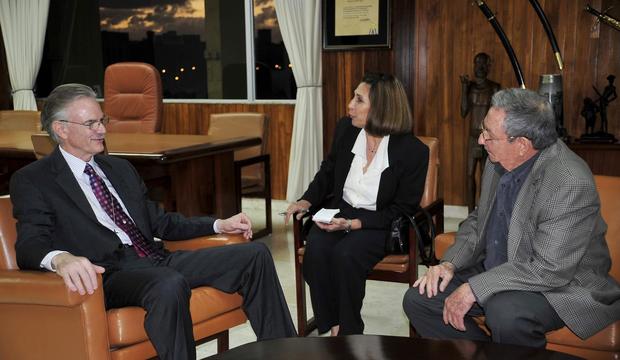Church leader sees no change in Alan Gross case
HAVANA -- Signs indicate that not even Cuba's professed desire for improved relations with the United States will lead to the release of Alan Gross, a sub-contractor arrested by Cuba while working for a U.S. government-funded pro-democracy program, an agenda Havana sees as seeking regime change.
The head of the U.S. National Council of Churches, Michael Kinnamon, told reporters Friday morning that he discussed the case with Cuban President Raul Castro this week, expressing concern for Gross' health and that of his family and urging the Cuban leader to consider the humanitarian aspects of the situation.
Kinnamon and another unnamed member of his group spent nearly an hour with Gross on Wednesday morning, during which the sub-contractor expressed his belief that he had been "unjustly accused." The church leader refrained from taking a position saying he did not know the "validity" of the case against Gross nor had he seen the trial record.
Kinnamon said he had not asked Castro to release Gross, 62, and instead the two spoke only of the humanitarian issues involved. He described the Cuban leader as also expressing concern over the health issues confronting the Gross family.
Castro did not indicate that he was considering pardoning Gross, but he did tell Kinnamon that he would like Cuba to have normal relations with the U.S. and that everything was on the table. "As far as he's concerned, the Cuban government is willing to speak about any issues with the United States but they need to be spoken about in an atmosphere of mutual respect," Kinnamon told the press, adding, "You can't simply come with one side dictating terms in advance of the conversation."
Saturday is the second anniversary of Gross' arrest for smuggling illegal communications equipment into the island. He was convicted and sentenced to 15 years in March under a statute covering crimes against the state.
His defenders claim he was only trying to help the local Jewish community improve their Internet access, though community leader Adela Dworin has denied that he officially approached her to discuss this -- in fact, she says she has no memory of meeting him. However, the former vice president of Havana's Beth Shalom synagogue, William Miller, testified at Gross' trial that he did approach individuals at the synagogue on various occasions. Miller claims that he was unclear about exactly what was behind Gross' activities.
White House spokesman Jay Carney told reporters in Washington Friday that it was "past time" to let Gross return home. "Cuban authorities have failed in their effort to use Mr. Gross as a pawn for their own ends," he said. Also the State Department issued a press statement calling on the Cuban government for his release. The statement refers to his "unjustified imprisonment" and reiterates the claim that he was "simply facilitating connectivity between Havana's Jewish community and the rest of the world."
Pleas for Gross' release have also come from his mother, who released a video directed to Castro, and sister, both of whom live in Dallas. A letter circulated by Dallas Rabbi Stefan Weinberg says that 75 people attended the Congregation Anshai Torah's first congregational meeting last Monday in support of Gross and were briefed by his sister Bonnie Rubinstein, who will chair a committee set up by the shul to promote activities to publicize the case.
Kinnamon stressed that his conversation with Castro was not limited to the Gross case but that he also told him the National Council of Churches would "continue to press the issues that are roadblocks to normal relations with our government."
The National Council of Churches represents 50 million people and, according to Kinnamon, works with other organizations representing between 60 to 70 million members. He said he was "not talking about any kinds of trades or anything of that sort" but that "there are humanitarian issues with regard to the Cuban Five that need to be addressed." The Cuban Five, heroes on the island, are intelligence agents held for more than a decade in U.S. prisons. There has been speculation that Havana wants a prisoner swap--Gross for the five.
The 16-member National Council of Churches delegation also met at a local Baptist Church Wednesday with the wives and one daughter of the Cuban Five. "We ache with them for the separation that weighs so heavily on their families," Kinnamon told the press. "We will press strongly for the right to visit their husbands. We join international organizations in believing that the sentences are not just and we will continue to try to work for their release in the United States," he concluded.
Cuba insists the five agents were not engaged in spying against the United States but monitoring Cuban American groups that engage in terrorism against the island. Their return is a top political priority for the government here.
Kinnamon said the National Council would be meeting with State Department officials on their return to the U.S. but did not know if or when he might be able to discuss Cuba with President Obama.
